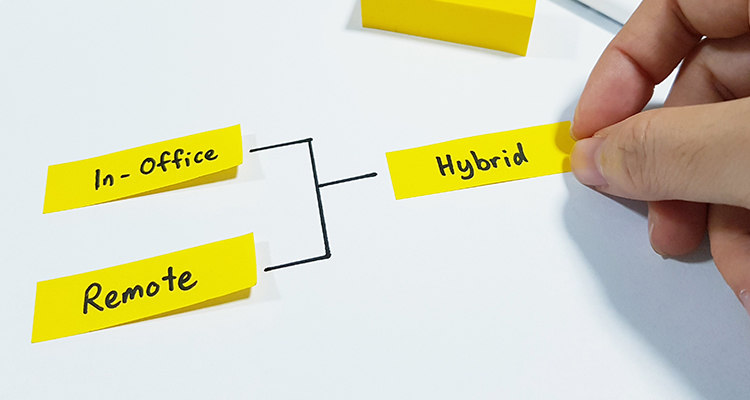The office is where we go to work. Up until recently, that is.
During the pandemic, companies were forced to adopt remote and hybrid models which paved the way for remote work to go mainstream. Fast forward to the present, and now, both hybrid and remote work set-ups are much sought after. In fact, recent studies show that both employees and employers find it more productive.
Thus, in case you have yet to decide whether to adopt a hybrid workplace or go fully remote, we’ve come up with some basic information that can help.
Defining a Hybrid Workplace

As its name suggests, a hybrid workplace enables your employees to work from or report to the office on certain days- while working remotely for the rest of the week. For companies that are in industries like manufacturing, this is ideal since they need people onsite to monitor production.
Meanwhile, other organisations in some industries provide different versions of how to implement it.
Some have co-working spaces for remote workers who choose to be onsite. They also have meeting rooms where teams can collaborate and brainstorm face-to-face.
Overall, this model’s flexibility draws employees who want to work remotely -but still visit the office every now and then.
In short, a hybrid workplace allows them to customise their schedules to their own liking.
Hybrid Work and Its Benefits

Obviously, hybrid work is good for most employees. However, employers can also benefit immensely from it.
For instance, a remote collaborative worker survey revealed that 77 percent of hybrid workers report higher productivity levels in a flexible remote setup. On top of that, they were also less likely to take time off since they have more work-life balance.
This is largely because of the hybrid model’s ability to build engagement and encourage results-based productivity. Instead of logging in fixed hours in the office, workers focus more on results.
If they would like to collaborate in person (or are craving a change of scenery), they can visit the office. Conversely, if they want to focus on significant individual tasks and work alone, they can do so from home.
Either way, they’ll be more focused on results, which is always good for the business.
Adopting a Hybrid Work Model

Before you adopt a hybrid work model, however, it’s important to know your team and what motivates them.
How often do they want to work from home? Do you have enough space in your office for onsite collaboration? Can you provide the structure for a modern hybrid working environment?
While a hybrid work model is ideal, especially nowadays, it’s not always possible or feasible. In which case, many companies would rather adopt a fully remote workplace.
Either way, your employees will still have work flexibility without sacrificing their productivity.
When implemented well, both remote and hybrid workplaces foster cultures that prioritize communication and collaboration. The traditional office is fast becoming a thing of the past in many industries and the future is all about emerging digital workplaces.
Looking to make a powerful and positive change for your business? It might be time to shift to a hybrid, if not a fully remote, set-up.
Fortunately, Remote Staff has been assisting more than 3,000 Australian entrepreneurs like you find and hire skilled remote workers from the Philippines since 2007. Aside from this, we also assist with onboarding so you’ll have a smoother transition to a fully remote work set-up.
So call us today or schedule a call back and let’s get started.
Serena has been working remotely and writing content for the better part of the last decade. To date, she's written for Pepper.ph and Mabuhay Magazine, among others, and has churned out more than a thousand articles on everything from The Basics of Stock Market Investing to How to Make Milk Tea-Flavored Taho at home. Hermits, aspiring hermits, and non-hermits with interesting project propositions may email her at serena.estrella10@gmail.com.





















